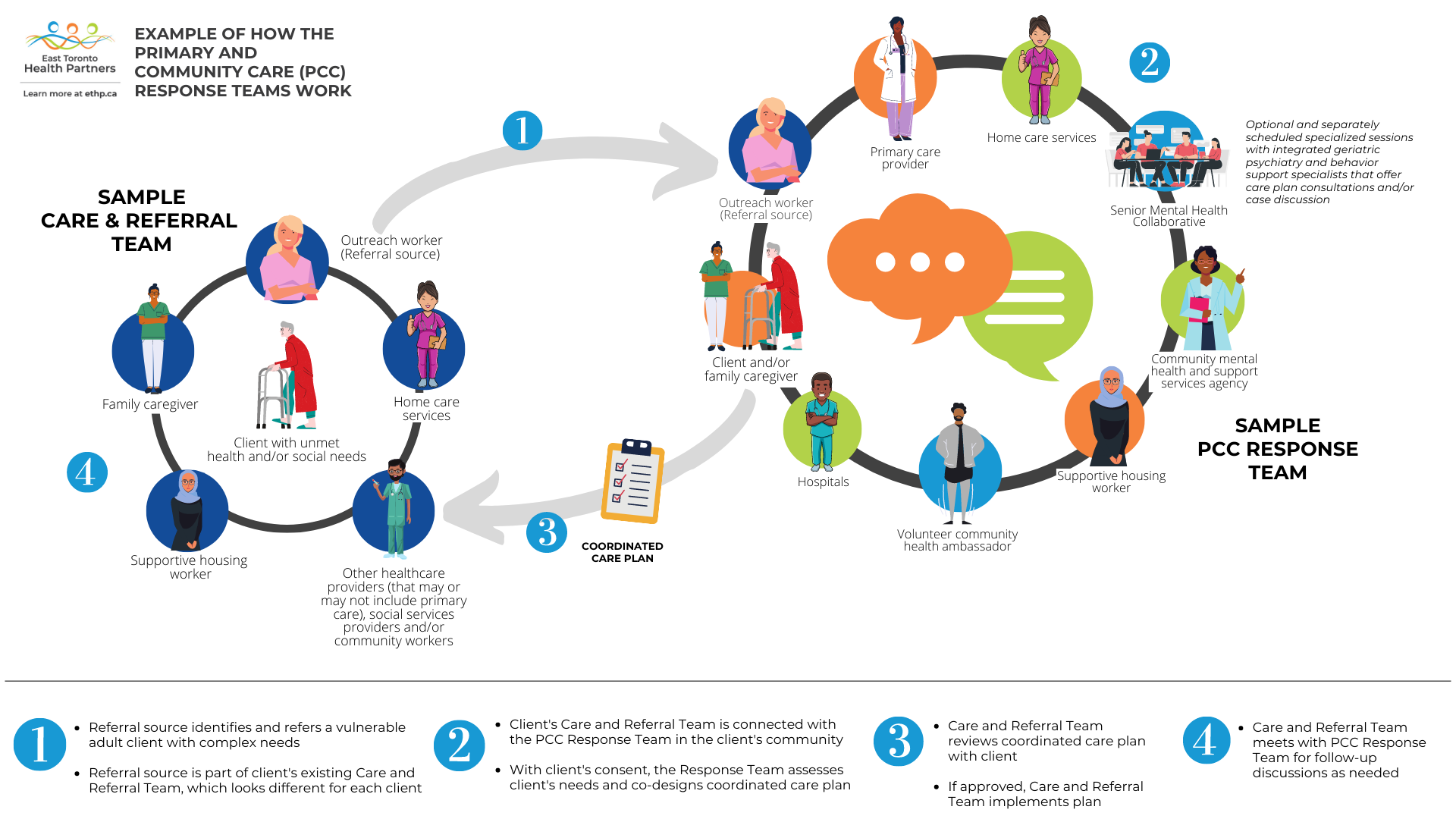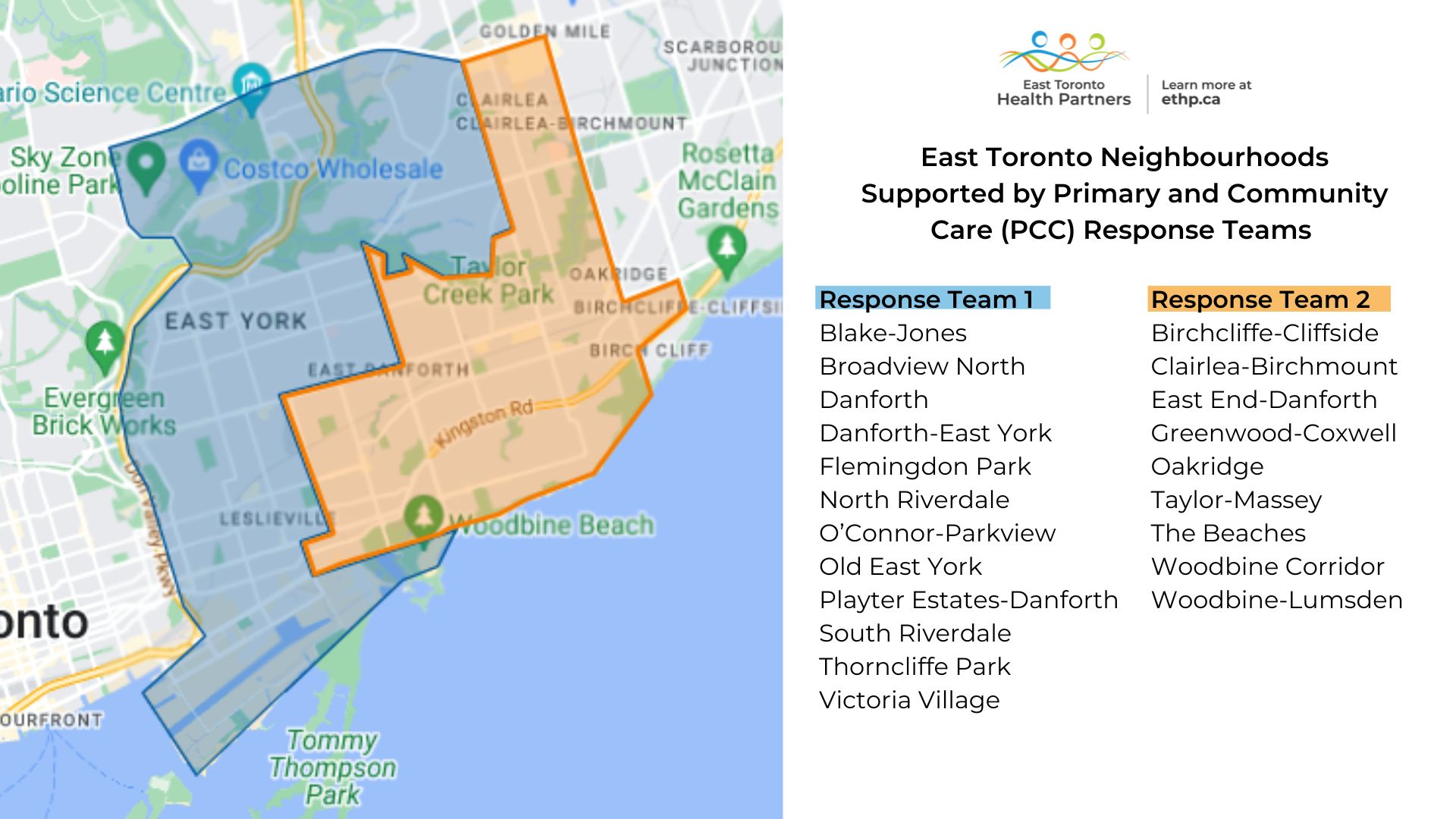
Information for Health and Social Service Providers about Primary and Community Care Response Teams (PCCRT)
The Primary and Community Care Response Teams (PCCRT) provide care planning support to you and the rest of your client’s care and support team through:
- Supporting care planning at regularly scheduled rounds where you can discuss your client in a de-identified way to get advice and/or to get help connecting to health and social services.
- Collaboratively creating a secure, accessible, amendable Coordinated Care Plan (CCP) for your client that can be used by you and the rest of your client's care and support team to plan and coordinate integrated care. (Note: Client consent is required for this support. Please read the frequently asked questions below.)
The Primary and Community Care Response Teams (PCCRT) is an integrated care program of East Toronto Health Partners (ETHP), the Ontario Health Team (OHT) serving East Toronto.
Who is eligible?
Any adult aged 18 and older who you are worried about. We prioritize people who:
- Have unmet health and social needs
- Are facing barriers to health and wellness
- Live in the area loosely bounded by Eglinton Avenue on the north, Lake Ontario on the south, Midland Avenue on the east, and the Don Valley Parkway/Millwood Road on the west (please refer to the map below)
Clients do not need to have a family doctor or health card.

Who can refer a client?
A referral can be submitted by any health or social service provider on the client’s care and support team, including case managers, outreach workers, primary care providers, social workers, supportive housing workers and more.
How do I refer a client?
IMPORTANT: If this is the first time you are submitting a referral or a de-identified case, and/or accessing the Coordinated Care Plans (CCPs) for any of your clients, you need to register for ETHP Collaborate. Please click the green button below to learn more. The approval process for this can take up to three business days but only needs to be done once.
Once you are a registered user of ETHP Collaborate, follow the steps below to submit a referral:
- Sign in to ETHP Collaborate.
- Download and use the consent form to obtain informed consent from your client.
- Note: If your client does not consent, you can still submit a de-identified case for discussion to get some support and/or advice. See instructions for how to submit a de-identified case.
- See instructions for how to refer a client who has provided informed consent.
- Complete form and submit.
Note: If you are an Ocean user, you can use the “Add to Favourites” function to add the Primary and Community Care Response Teams (PCCRT) listing to your main page of the Ocean Health Map, making it easier to access this webpage when you are using the directory.
What can I expect?
After submitting a referral or de-identified case, you will:
- Be able to track the status of your referral/case by clicking on “Referrals” or “Cases” in the left-hand toolbar and looking in the status column.
- Receive a confirmation email telling you if your referral/case has been approved which outlines next steps. If you have not received an email within three business days, please check your spam and junk folders. If you are still unable to locate your confirmation email, please contact Lori Sutton, Project Facilitator, at Lori.Sutton@tehn.ca.
- Be contacted by the Primary and Community Care Response Teams (PCCRT) Program Coordinator, using the above email thread, within three business days to schedule the specific day/time you will be attending the virtual rounds.
- Receive a calendar invite, with a videoconference link, for the rounds you will be attending:
- You may forward the invite to other members of the client’s care and support team who would like to attend the rounds and present with you.
- In some cases, you may be able to support the client and/or caregivers to attend as long as they understand that their participation may make them identifiable to Primary and Community Care Response Teams (PCCRT) members who are not on their care and support team.
- Note: If this is desired, please let the Primary and Community Care Response Teams (PCCRT) Coordinator know.
At rounds, you will:
- If the client has provided informed consent, work with the program to collaboratively develop the client’s Coordinated Care Plan (CCP).
- If the client has not provided informed consent, present your client as a de-identified case to get advice and support from the rounding team.


